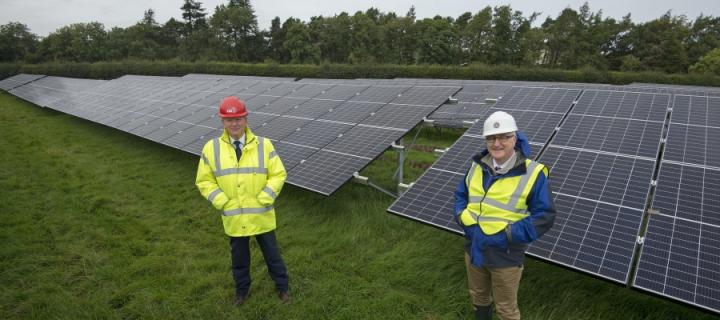Solar farm to generate green power for the Easter Bush Campus
A new solar farm at the Easter Bush Campus will provide 15 percent of the electricity requirements.

A solar farm on the Easter Bush Campus is nearing completion and will provide 15 percent of the site’s electricity consumption, equivalent to power for around 500 homes.
The site, which will be the size of five football pitches, will be connected to the William Dick building, clinical hospitals and other buildings on campus. Its photovoltaic (PV) panels are expected to generate more than 1.4m kWh of electricity a year.
Together with existing generation capacity, 60 per cent of Easter Bush’s electricity and 30 per cent of its heat, will be generated on site from low or zero-carbon technologies. This looks to save around two hundred thousand pounds a year in electricity costs and help work towards the University of Edinburgh's ambition to be carbon neutral by 2040.
The campus has led the way in adopting green technology and offering alternatives to travel, with an integrated sustainability strategy, free EV charging points available across the campus and a series of initiatives designed to encourage cycling and other low carbon commuting options.
Zero Carbon Ambitions
The University of Edinburgh was an early adopter of PV technology. Its first panels were installed at its King’s Buildings campus in 2007 and have since generated nearly 1,000MWh.
The Easter Bush development includes a ‘living laboratory’ for solar PV research, enabling researchers to investigate improved methods of generating green power.
In recent years, the University’s solar installations have generated an average of 265MWh of electricity annually. The new development will substantially increase that figure, to an average annual figure of 4,500 MWh, which will save more than 1,000 tonnes of carbon emissions each year.
Edinburgh’s ambition of becoming carbon neutral by 2040 represents one aspect of the University’s commitment to social and civic responsibility and to meeting the UN’s Sustainable Development Goals
The University has invested more than £20 million in low-carbon energy in recent years. The solar farm at Easter Bush will not only allow us to lead the way in the practical implementation of such technology, but research the next generation of low-carbon energy.
Producing clean power at Easter Bush is a welcome development that enhances our overall sustainability strategy. It not only produces energy efficiency savings, it also reduces the site’s impact on the environment.
Links
Dick Vet looks to the future with electric vehicle charging points
Easter Bush Campus wins Sustainability and Social Responsibility Awards
About the Royal Dick School of Veterinary Studies
The Royal (Dick) School of Veterinary Studies is a one-of-a-kind centre of excellence in clinical activity, teaching and research. Our purpose-built campus, set against the backdrop of the beautiful Pentland Hills Regional Park, is home to more than eight hundred staff and almost fourteen hundred students, all of whom contribute to our exceptional community ethos.
The School comprises:
- The Roslin Institute
- The Global Academy of Agriculture and Food Security
- The Roslin Innovation Centre
- The Hospital for Small Animals
- Equine Veterinary Services
- Farm Animal Services
- Easter Bush Pathology
- The Jeanne Marchig International Centre for Animal Welfare Education
We represent the largest concentration of animal science related expertise in Europe, impacting local, regional, national and international communities in terms of economic growth, the provision of clinical services and the advancement of scientific knowledge.


